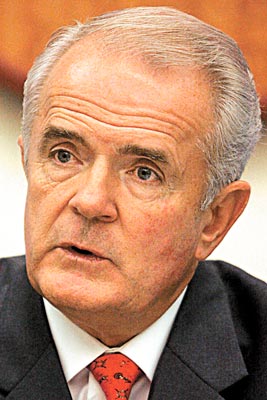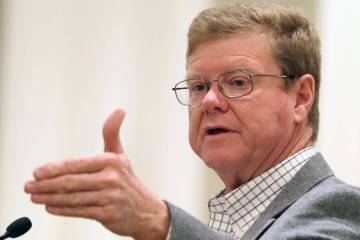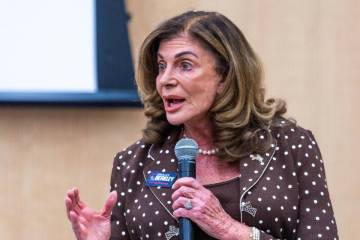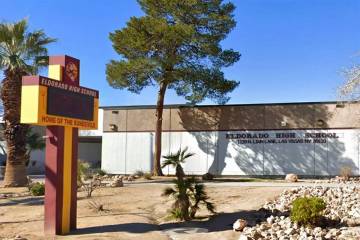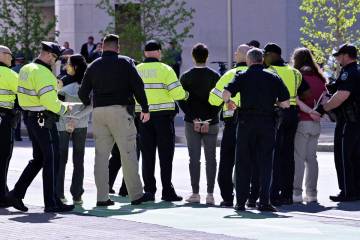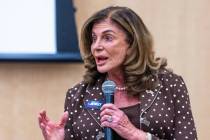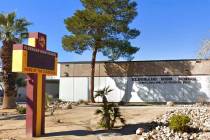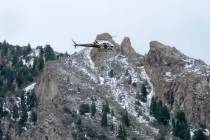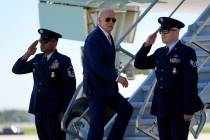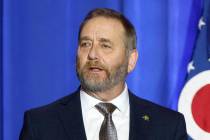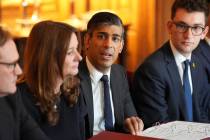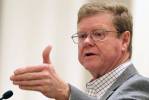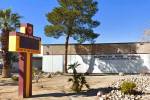Gibbons: State should get bigger tax share
Gov. Jim Gibbons on Monday said he thinks some taxpayer dollars that go to local governments could be used better by the state and said he hopes the next Legislature will examine the issue.
Gibbons said he has been talking to state Senate Majority Leader Bill Raggio, R-Reno, about tinkering with the formulas that make property taxes the primary base for local government, while the state relies more on sales taxes.
"I think Raggio has the right idea that we need to look at how we allocate revenues," he said. "That should be a study that the Legislature does, how do we allocate state revenues. We ought to look at what share of revenues go to cities and counties."
Gibbons returned several times to the idea over the course of an hour-long interview with the Review-Journal's editorial board and said giving the state control of a bigger share of tax revenues could mitigate seemingly constant shortfalls.
Since Gibbons presented a budget to the 2007 Legislature, revenue projections have gone down by more than half a billion dollars because of lagging sales tax receipts.
"I'm trying to be optimistic, hopefully, that a lot of the growth that we're seeing in the commercial sector, especially down here in Las Vegas, is going to mitigate the bottom of this bathtub in terms of the economy," Gibbons said. But it would be helpful if revenues weren't so dependent on sales taxes, he said.
"Maybe we ought to be looking at the state's contribution to counties and cities," Gibbons said. "As you know, you have a property tax base here in the county that the state doesn't have. You need to look at that allocation once again to see whether or not we can mitigate this constant cyclic affair with the sales tax."
Local government revenues would not go to other localities, he said. One county's money would not be used to help another county. Rather, the revenues would go to the state to be spent on services and functions the state is responsible for.
Raggio could not be reached for comment late Monday on the ideas Gibbons attributed to him. A spokeswoman for the governor said there is no formal proposal to shift the tax structure.
In previous years, expert studies of the state's tax structure have been commissioned, such as one charged by former Gov. Kenny Guinn.
But Gibbons said those studies focused on revenue sources, and he is not interested in raising taxes or changing what kind of taxes exist. The issue, he suggested, is not how much money taxes bring in, but to whom the dollars go.
"We have studied revenue sources," he said. "What we need to study is revenue allocation, so the state isn't going through this tremendous cyclic nature that it's going through now."
In a reaction to California's Proposition 13, Nevada in 1981 reduced the amount of property taxes in the state's budget and increased the state's sales tax. It was an ugly battle and one Gibbons should be wary of repeating, said Assembly Speaker Barbara Buckley, D-Las Vegas.
"These shifts ... always raise the issue that you're trying to steal our area's money," she said. "I would suggest to him that he would be very wise to bring all the players to the table to avoid some of the acrimony that there was in the past and to ensure that you're not going to cripple local governments."
Property taxes pay for school construction, police, firefighters, parks and hospitals, she said. "Which of those line items is better funded than it needs to be?" she said. "Which one shows that the county is getting more than enough money? Clark County needs more parks, not less parks."
Clark County Manager Virginia Valentine said local government is already strapped.
"The county does not have a surplus," she said. "We have been deferring capital projects to keep (University Medical Center) running."
Local governments over the years have taken on more and more responsibilities that once belonged to the state, while their revenue situation is largely the same, she said.
"There's a misperception that our funding stream is different from the state's," she said. "When ours goes down, theirs goes down."
State Sen. Bob Beers, R-Las Vegas, is another legislator Gibbons has been discussing the allocation-altering idea with. Beers said the changes made in 1981 had accumulating consequences that legislators at the time did not foresee.
A major part of the problem is that the law requires local governments, but not the state, to engage in collective bargaining to arrive at employee salaries and benefits, he said. Overpaid local government workers is a crusade of Beers, whose wife works for Clark County.
Beers said local governments in Nevada pay some of the highest wages in the country, eating up most of the property tax money and leaving the governments unable to provide adequate services.
"Long term, we need to rearrange who's responsible for which services," he said.
In the Monday interview, Gibbons predicted a difficult time when the Legislature reconvenes in about a year.
"It's going to be a horrible session simply because everybody's going to be looking at a much smaller pie," he said. "A lot of the special interest groups that are always dependent on getting an increase may not see the same size or level of increases."
He said that despite the economic woes the state faces, he was not interested in calling a special legislative session.
"If we can accomplish this without the added burden and cost of going into a special session of the Legislature, and the delays and arguments that would be inherent in something like that, we're far better off just to make a decision, as the law requires for the governor of the state to do those things that are necessary to keep us in balance, and that's what I've decided."
Asked about Friday's blaze at the Monte Carlo, Gibbons joked, "I wasn't there to put it out. I'm sorry. I couldn't find my bucket."
Whether the fire affects the economy, he said, will depend on whether "some people are saying, 'Well, I don't know whether it's safe or not safe to come to Nevada.' I think a bigger threat (to the economy) is terrorism. One little car bomb in a hotel in Elko is going to devastate the state."
Gibbons said he participated in the Jan. 19 presidential caucuses but would not say which candidate he supported.
Gibbons' wife, Dawn, endorsed Republican Mitt Romney, but Gibbons said he wanted to remain publicly neutral. He called the caucus, the earliest presidential nominating contest in the state's history, a great thing for Nevada, but seemed not to understand the difference between a caucus and a primary.
The state, he said, should stick with a caucus "because it puts us in that category of attention we're getting" with other states where there are "caucuses going on, whether it's New Hampshire, Iowa, Florida, South Carolina or Florida. What we really have done is moved Nevada into a special category of attention."
Nevada's caucuses were chaotic, he said, "but I guarantee you New Hampshire probably didn't have any better time the first time they did it."
Nevada wouldn't be as relevant, he said, "if you have a primary and everybody's talking about caucuses."
New Hampshire has presidential primaries, not caucuses. Only Iowa and Nevada, of the states Gibbons listed, have caucuses, which are neighborhood political meetings, as opposed to primaries, which are regular statewide elections. Either type of contest can be held at any time.
Contact reporter Molly Ball at mball@reviewjournal.com or (702) 387-2919.



